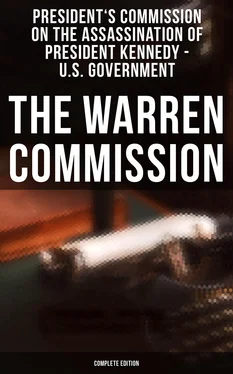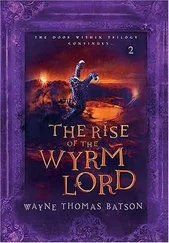Mr. Rankin. Did you say that you wanted him to go to New Orleans because of the Walker incident?
Mrs. Oswald. No. I simply told him that I wanted to see his home town. He had been born there.
Mr. Rankin. When he promised you that he would not do anything like that again, did you then believe him?
Mrs. Oswald. I did not quite believe him inasmuch as the rifle remained in the house.
Mr. Rankin. Did you ask him to get rid of the rifle at that time?
Mrs. Oswald. Yes.
Mr. Rankin. After he shot at Walker, did you notice his taking the rifle out any more to practice?
Mrs. Oswald. No.
Mr. Rankin. Do you recall when you went to New Orleans?
Mrs. Oswald. I think it was in May. Lee went there himself, by himself. At that time, I became acquainted with Mrs. Paine, and I stayed with her while he was looking for work. In about one week Lee telephoned me that he had found a job and that I should come down.
Mr. Rankin. When did you first get acquainted with Mrs. Paine?
Mrs. Oswald. I think it was a couple of months earlier—probably in January.
Mr. Rankin. How did you happen to go to Mrs. Paine's house to stay? Did she invite you?
Mrs. Oswald. Yes; she invited me. I had become acquainted with her through some Russian friends of ours. We had visited with some people, and she was there. Inasmuch as she was studying Russian, she invited me to stay with her.
Mr. Rankin. Did you pay her anything for staying with her?
Mrs. Oswald. No, I only repaid her in the sense that I helped her in the household and that I gave her Russian language lessons. This, in her words, was the very best pay that I could give her. And she wanted that I remain with her longer.
But, of course, it was better for me to be with my husband.
Mr. Rankin. How did your husband let you know that he had found a job?
Mrs. Oswald. He telephoned me.
Mr. Rankin. Did you then leave at once for New Orleans?
Mrs. Oswald. Yes.
Mr. Rankin. And how did you get to New Orleans from Dallas?
Mrs. Oswald. Mrs. Paine took me there in her car. She took her children and my things and we went there.
Mr. Rankin. Did you have much in the way of household goods to move?
Mrs. Oswald. Everything—we could put everything into one car. But, in fact, most of the things Lee had taken with him. Because he went by bus.
Mr. Rankin. Did he take the gun with him to New Orleans?
Mrs. Oswald. I don't remember exactly, but it seems to me that it was not among my things.
Mr. Rankin. Where did you live at New Orleans?
Mrs. Oswald. Magazine Street. By the time I arrived there Lee already had rented an apartment.
Mr. Rankin. When Mrs. Paine brought you down to New Orleans, did she stay with you for any period of time?
Mrs. Oswald. Yes, she was there for two days.
Mr. Rankin. How did Mrs. Paine and your husband get along? Were they friendly?
Mrs. Oswald. She was very good to us, to Lee and to me, and Lee was quite friendly with her, but he did not like her. I know that he didn't like her.
Mr. Rankin. Did he tell you why he didn't like her?
Mrs. Oswald. He considered her to be a stupid woman. Excuse me—these are not my words.
Mr. Rankin. Were you and Mrs. Paine good friends?
Mrs. Oswald. Yes, so-so. I tried to help her as much as I could. But I also—I was—I did not like her too well. I also considered her not to be a very smart woman.
Mr. Rankin. I think it is about time for a recess, Mr. Chairman.
The Chairman. Very well. We will take a recess for 10 minutes.
(Brief recess.)
The Chairman. The Committee will be in order.
Mr. Rankin, you may continue.
Mr. Rankin. Mrs. Oswald, did you discuss the Walker shooting with Mrs. Paine?
Mrs. Oswald. No. I didn't tell anyone. Apart from the FBI. That is after—that is later.
Mr. Rankin. When was it that you told the FBI about the Walker shooting?
Mrs. Oswald. About 2 weeks after Lee was killed.
Mr. Rankin. Before you went to New Orleans, had you seen anyone from the FBI?
Mrs. Oswald. The FBI visited us in Fort Worth when we lived on Mercedes Street.
Mr. Rankin. Was that in August 1962?
Mrs. Oswald. Probably.
Mr. Rankin. Do you know the names of the FBI agents that visited you then?
Mrs. Oswald. No, I don't remember that Lee had just returned from work and we were getting ready to have dinner when a car drove up and man introduced himself and asked Lee to step out and talk to him.
There was another man in the car. They talked for about 2 hours and I was very angry, because everything had gotten cold. This meant more work for me. I asked who these were, and he was very upset over the fact that the FBI was interested in him.
Mr. Rankin. Did that interview take place in the car?
Mrs. Oswald. Yes.
Mr. Rankin. Did your husband tell you what they said to him and what he said to them?
Mrs. Oswald. I don't know to what extent this was true, but Lee said that the FBI had told him that in the event some Russians might visit him and would try to recruit him to work for them, he should notify the FBI agents. I don't know to what extent this was true. But perhaps Lee just said that.
Mr. Rankin. Did our husband say anything about the FBI asking him to work for them?
Mrs. Oswald. No, he didn't tell me.
Mr. Rankin. Did he say anything more about what they said to him in this interview?
Mrs. Oswald. No, he didn't tell me verbatim, but he said that they saw Communists in everybody and they are very much afraid and inasmuch as I had returned from Russia.
Mr. Rankin. Did he tell you that they had asked him whether he had acted as an agent or was asked to be an agent for the Russians?
Mrs. Oswald. No.
Mr. Rankin. Do you recall any other——
Mrs. Oswald. Excuse me. They did ask him about whether the Russians had proposed that he be an agent for them.
Mr. Rankin. Did he tell you what he said to them in that regard?
Mrs. Oswald. He told me that he had answered no.
Mr. Rankin. After this interview by the FBI agents, do you recall any later interview with them and yourself or your husband before you went to New Orleans?
Mrs. Oswald. No, there were no other interviews.
The next time was in Irving, when I lived with Mrs. Paine. But that is after I returned from New Orleans.
Mr. Rankin. At New Orleans, who did your husband work for?
Mrs. Oswald. He worked for the Louisiana Coffee Co. But I don't know in what capacity. I don't think that this was very good job, or perhaps more correctly, he did not—I know that he didn't like this job.
Mr. Rankin. Do you know what he received in pay from that job?
Mrs. Oswald. $1.35 an hour, I think. I am not sure.
Mr. Rankin. How long did he work for this coffee company?
Mrs. Oswald. I think it was from May until August, to the end of August.
Mr. Rankin. Was he discharged?
Mrs. Oswald. Yes.
Mr. Rankin. And then was he unemployed for a time?
Mrs. Oswald. Yes.
Mr. Rankin. After you had discussed with your husband your going to Russia, was anything done about that?
Mrs. Oswald. Yes, I wrote a letter to the Soviet Embassy with a request to be permitted to return. And then it seems to me after I was already in New Orleans, I wrote another letter in which I told the Embassy that my husband wants to return with me.
Mr. Rankin. Do you recall the date of the first letter that you just referred to?
Mrs. Oswald. No. But that is easily determined.
Mr. Rankin. Were you asking for a visa to return to Russia?
Mrs. Oswald. Yes.
Mr. Rankin. Did you discuss with your husband his returning with you before you wrote the second letter that you have described?
Mrs. Oswald. I didn't ask him. He asked me to do so one day when he was extremely upset. He appeared to be very unhappy and he said that nothing keeps him here, and that he would not lose anything if he returned to the Soviet Union, and that he wants to be with me. And that it would be better to have less but not to be concerned about tomorrow, not to be worried about tomorrow.
Читать дальше












